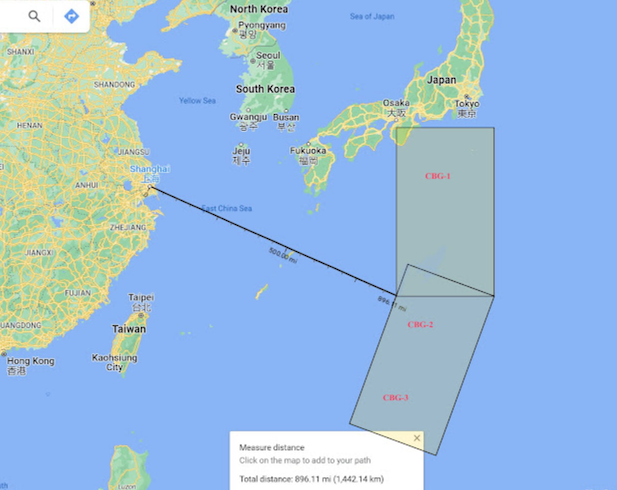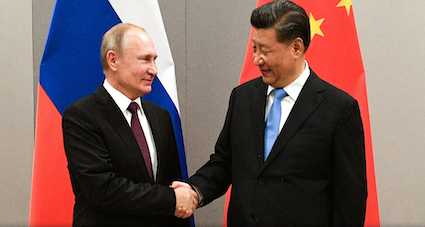I am amused at how synchronized “Russia-is-a-junior-partner-to-China” chorus has gone up in West in the wake of Xi Jinping’s visit to Moscow this week.
John Kirby spoke of Russia “certainly are the junior partner” in the regular daily White House briefing; Antony Blinken too was adamant that Russia is “very much the junior partner.”
Then the Western mainstream media went into an overdrive: Foreign Affairs has called Russia as China’s “new vassal”; NBC says Putin occupies only the “back seat”; Financial Times, MSNBC…you name them, all have chortled at the lesser Russia in the alliance.
Then I heard Pankaj Saran, former Indian ambassador to Russia and ex Deputy National Security Adviser, say in a show that Russia would never accept to be a “junior partner (stamp 13.14). And further, that “I don’t think Russia will mortgage its foreign policy to China.”
Then why has this orchestrated noise on “little Russia” ratcheted up this week?
One, of course is to hurt proud Russians enough to make them revisit every move China makes vis-a-vis them; two is to prod the national scar which Russia suffered at the hands of the Mongols in the 13th century; three, to arm the considerable West-symphatizers who abound in Russia.
But this aside, is Russia really a “junior partner” who won’t matter without China’s benevolence?
History tells us that those who matter either have money or weapons: Those who have money can buy weapons and those who have weapons —well, they could have anyone’s money!
Smile over, let’s look it from the natural order of things: No two things are equal, not even identical twins. Synergy happens when two forces bring their best on the table. It makes both of them stronger: just as it happens in between two organisms.
Russia today has weapons to envy; China has the economic beef to matter. Which of the two components matter more in the synergy? Let’s examine.
Russia presently is years ahead of the United States in quality if not quantity of weapons. It’s hypersonic missiles today gives it years’ of advantage against anyone on the planet.
What is Hypersonic Missiles?
Well, Russia has three types of them: Zircons, Kinzhals and Avantguards.
Kinzhals have a speed of 12-15 mach (the speed of sound is 3.5 mach). All the Anti-Ballistic Missiles (ABM) which the United States has, or it has deployed along the Poland-Romania axis, could only work against missiles less than the speed of sound.
Very early in the Ukraine Conflict, Russia showcased Kinzhal hypersonic missiles to let the US/NATO know what they are dealing with.
Barely a few weeks into its Special Military Operation (SMO), Russia unleashed Kinzhal on a formidable Ukrainian weapons depot built to blunt a nuclear strike. The depot was way down into the guts of Mother Earth, some 500 ft below the surface, and fortified with several layers of armoured concrete.
That Kinzhal first rose up to 40km on the sky, and then dived perpendicularly at the speed of 15 Mach; triggering scary kinetic energy before piercing through the seemingly nuke-protected underground weapons depot as a knife would through butter.
The impact on the depot was fatal but perhaps not as nightmarish as it’s on the wiseheads of Pentagon and NATO.
Now Kinzhals are specifically meant to neutralize aircraft carrier strike groups. The United States has 11 of them and at best it could use six at one time. Russia last week fired six of its Kinzhals in one go—implying it could wipe out active US aircraft carrier groups in one strike.
Presently, Russia has 50 Kinzhal missiles. It has the capacity to build 200 Kinzhal missiles a year. It could be delivered from all platforms conceivable: Air, sea, submarines etc. It would take the United States/West many years before they could have a weapon of this quality. Much would have changed by then.
Now Kinzhal missile has a range of 2,000km. And it is here where the China-senior-Russia-junior narrative could be put to bed.
Look at this map below:

Presently the US aircraft carriers are stationed at CBG -1,2 and 3 (in shaded rectangles), some 1,500km away from Shanghai. China does have a DF-21 ballistic missile and claims it could strike up to 1,500km. But with Kinzhal missile, the touch-and-go distance don’t matter.
I happened to glance at the purchase power parity in 2022 and found out that Russia’s was $31,962 and China’s $21,291. This after the devaluation of the Ruble after 2013.
Russia has all the things it needs for a modern life: energy, minerals, commodities, foodstuff etc. China, on the other hand, imports most of them. And does so through the sea routes which are increasingly becoming fragile. China’s enemies could conjure up a blockade and cripple Beijing even without a nuclear strike.
Of course, it’s there for anyone to see that China’s buying of Russia’s energy is a godsend for Moscow. But getting much of its enormous energy needs at a 70% discount isn’t a bad deal for China either.
So this “junior partner” dig is rather shameless. I wonder why this “vassal” or “junior partner” tag hasn’t been pinned on Germany, France, Italy etc. Indeed, they are no better than serfs. Such is their standing with Washington that the latter tells Olaf Scholz in public he would destroy Nord Stream gas pipelines. A Kishida is made to redraw his travel plan and dash to Kiev. Its the US which dictates to its puppets not to trade with Venezuela, Cuba or Iran.
No such thing is happening between Russia and China. The former isn’t grumbling on a rather passive support yet to Moscow; the latter isn’t stopping Russia from selling its energy to India and others, never mind if New Delhi is an integral part of QUAD against it. Nor do we find that China has blown up anyone’s energy gas pipeline.
That’s why I bristle at this crass stupidity of West in spinning the narrative. We hear Rishi Sunak of United Kingdom calling the AUKUS submarine deal against China and its “systemic challenge” as “brilliant.” I can understand India or China’s neighbours being fretful on Middle Kingdom. But how is United Kingdom endangered by China?
Who is a threat to peace here?
One who encroached the border of Vietnam last in 1978 or the one who is adding chapters to Iraq, Afghanistan, Libya, Yemen, Syria everyday?


